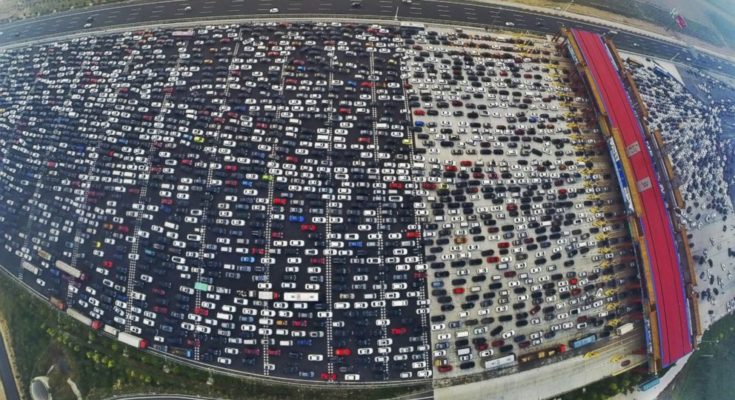Electric cars have been growing very popular recently because people believe that they are the future of transportation and that they solve everything wrong with cars. Is that correct? Let us look at it.
The most common problem everyone knows and thinks about is pollution. Cars release a lot of pollution. Electric cars run on electricity. As the name suggests they do not release pollution. Another thing with cars is that they are very unsafe. More than a million people lose their lives on the road every single year. In fact, cars are a hundred times less safe than trains. Electric cars are safer since they are futuristic and may be driven by Artificial Intelligence. But that’s all about it.
The fundamental problem lies in cars and everything about them. First they cost a lot, that has led them to be seen as a symbol of wealth especially in Indian society. Other than purchasing the car itself, the cost of fuel at hundred rupees a liter may outweigh the amount invested in car in its lifetime. A person on an average spent 5000 rupees on fuel every single month when fuel price was 70 rupees a liter. There are a hundred other costs to owning a car like insurance, loan interests, maintenance etc. This doesn’t even seem worth it when you realize that a car spends 90 percent of its entire life parked.

Andhra Pradesh 87.24 ₹/L
Assam 94.58 ₹/L
Bihar 105.90 ₹/L
Chhattisgarh 101.11 ₹/L
Gujarat 95.01 ₹/L
Haryana 96.06 ₹/L
Himachal Pradesh 96.06 ₹/L
Jammu And Kashmir 98.26 ₹/L
Jharkhand 98.48 ₹/L
Karnataka 100.58 ₹/L
Kerala 104.46 ₹/L
Madhya Pradesh 107.25 ₹/L
Maharashtra 109.98 ₹/L
Odisha 101.81 ₹/L
Punjab 94.90 ₹/L
Rajasthan 107.06 ₹/L
Tamil Nadu 101.40 ₹/L
Uttar Pradesh 95.05 ₹/L
West Bengal 104.67 ₹/L
NCT Of Delhi 95.41 ₹/L
Speaking of parking, did you know how much space is occupied in a city for big parking lots? These parking lots can be used for so many more things like building affordable housing.
Also, 14 percent of all land in a city is covered by roads and that is on an average! The image on the cover page is not a parking lot. It is an actual highway in China which is 26 lanes wide and it will just keep getting wider because the only solution we are coming up with is simply adding more lanes to highways to prevent slow traffic. The more roads are built, the more cars are being bought by people. Adding more lanes is doing absolutely nothing as the traffic on the road just increases. Other than that, cars are what make our cities so unlivable.
So first there is pollution which is not going to be solved by electric cars because of their high price and lack of infrastructure and capacity. Then there is all sort of loud noise coming from cars due to which people chose to live in congested suburbs that in turn forces people to have cars. Though it is more of an American problem!
Also, as I mentioned earlier cars are 100 times less safe than trains even though train accidents get a lot of media coverage.

My biggest reservation with cars is that they have completely overtaken our cities. Yes, our streets are no longer for people but for cars. This reflects class divide in our society since the poor can’t own expensive cars and have to either walk or use public transportation but cars make both inconvenient. Crossing the road is actually very scary and guess who can take the blame for that! Buses have also been made very inefficient and inconvenient because they are slow and not frequent enough. Again, cars are to blame for slow buses. Bus infrastructure may be expanded if people used them more instead of cars.
Car culture has also resulted in increased class and racial segregation. In early days of automobiles becoming a public obsession in the US, city planners would intentionally build low bridges around poor communities that were also predominantly black. Since they could not afford a car, they would have to take a bus to commute. Low bridges made it impossible for the buses to reach black populated downtown making their trip much more difficult. This is how “filthy peasants” were blocked from liberating themselves from poverty and climb the social ladder. It was a deliberate attempt to prevent them from accessing city’s affluent areas with all the skyscrapers and high paying jobs. Those low-lying bridges are still there and still performing the same role.
For all these evils owing to cars, I sincerely propose to ban them. A natural reaction must be like this- if we are to completely ban cars then how else would people travel? Has a car ban ever worked anywhere? Let me cite a few examples from past.
Once New York City did a trial run on car ban in one of its districts. Results were so good that buses had to slow down to be on schedule because they were just so fast. The most famous example is from Amsterdam, Netherlands. They reduced car use and made bicycles very popular. Another major example is the largest city in the world, Tokyo. Tokyo has very limited land and everyone owning a car would not work due to the limited parking space. So, Tokyo administration made life hell for car users. There are tolls everywhere inside the city, lanes are often very narrow, no parking on either side of the road, etc. To stop people from using cars, they built the world’s largest and best subway system. Because of that, using a car seems more inconvenient because they are much slower than the trains in Tokyo.
Related article:
I’ve Seen a Future Without Cars, and It’s Amazing
The lasting solution for banning cars in our cities is to simply make life hell for car owners. Idea is only to ban cars in our cities since they are the biggest problem. Same applies to any car coming from outside. Let them taste a literal hell too!





